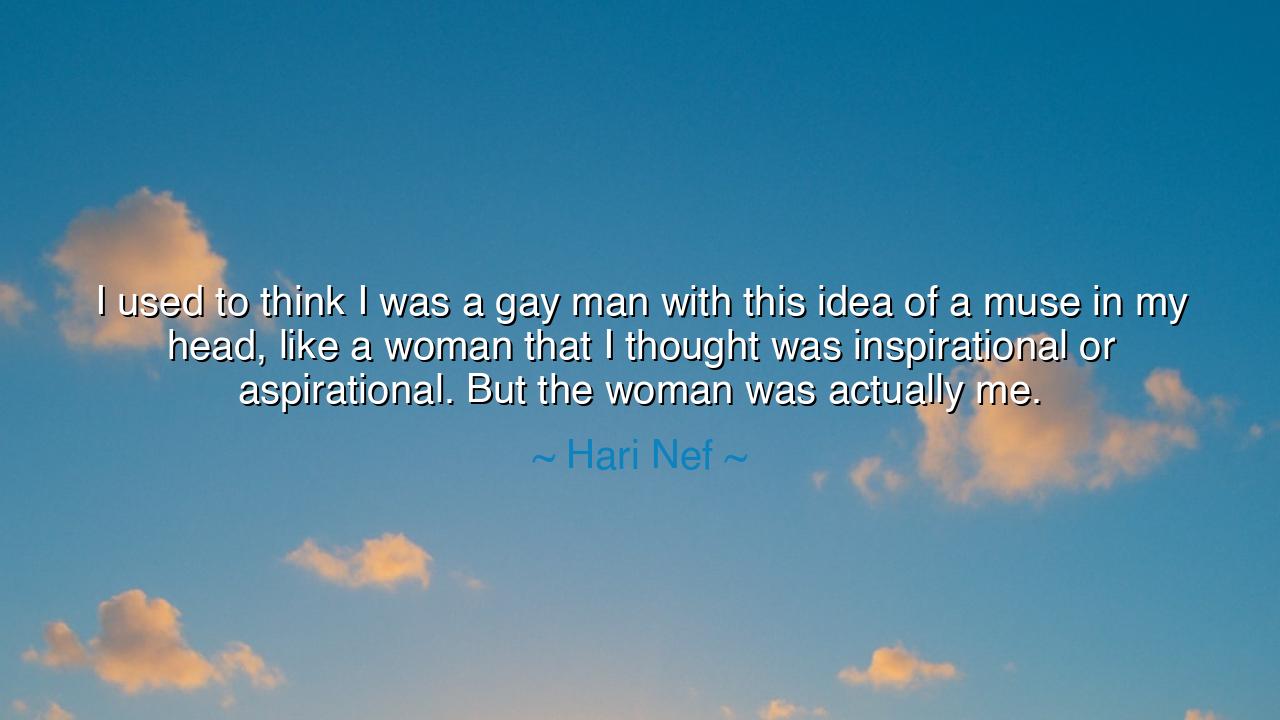
I used to think I was a gay man with this idea of a muse in my
I used to think I was a gay man with this idea of a muse in my head, like a woman that I thought was inspirational or aspirational. But the woman was actually me.






In the words of Hari Nef, spoken with candor and revelation, there lies the awakening of a soul reclaiming its reflection: “I used to think I was a gay man with this idea of a muse in my head, like a woman that I thought was inspirational or aspirational. But the woman was actually me.” This confession is not merely about identity — it is a song of self-discovery, the moment when one stops seeking the divine image outside themselves and realizes it has been living within all along. It is the triumph of self-recognition, the point at which longing becomes understanding, and inspiration becomes embodiment.
In the ancient world, the muse was the sacred source of creativity — the goddess who whispered art into the ears of poets and beauty into the hearts of sculptors. Men built temples to her, painters invoked her, and singers wept before her. Yet Hari Nef’s revelation transforms that ancient myth. She does not find her muse in another, but in the mirror. What she once worshipped as distant — this idealized, perfect, inspirational woman — she comes to understand as her own reflection. It is the awakening of a truth older than time: that the divine we seek in others is the divine that has always been within ourselves.
This journey — from projection to possession, from admiration to acceptance — is one that all humans, in some form, must undertake. The philosopher Plato wrote of love as a ladder: one begins by admiring beauty in another, but must climb higher until one recognizes that beauty itself is eternal and universal. Hari’s words echo that ascent. Once, she sought beauty and truth in the form of an imagined muse — the aspirational woman, ethereal and untouchable. But in time, she saw that the muse was not a dream to chase, but a truth to claim. The woman she admired was the woman she was always meant to be.
Her statement also carries the resonance of transformation — the sacred act of becoming one’s own creation. In ancient myths, the gods shaped mortals from clay, breathing spirit into their forms. But there is also a divine inversion, where the human becomes their own sculptor. Like Pygmalion, who carved a statue so perfect that it came to life, Hari Nef sculpted herself from the raw material of self-understanding and courage. The statue and the sculptor became one — the muse and the maker no longer divided. Her realization — “the woman was actually me” — is thus both artistic and spiritual, a declaration that creation and identity are inseparable.
There is profound freedom in such self-recognition. To realize that the qualities one once admired in others — grace, power, beauty, intelligence — are not foreign gifts, but latent truths within the self, is to awaken into sovereignty. The poet Rumi once said, “You wander from room to room, hunting for the diamond necklace that is already around your neck.” Hari’s quote is that moment of finding the necklace, of feeling its weight against the skin, of knowing that what she sought was never lost. The muse, once external and elusive, is revealed as the self — living, breathing, radiant, and whole.
But let us not mistake her words for vanity or self-worship. They are words of integration, not of ego. To see oneself as the muse is not to idolize the self, but to finally stop dividing it. It is to embrace both the artist and the artwork, the dreamer and the dream, the seeker and the sought. In this unity, there is peace — the kind that comes when a person no longer lives in fragments, but in fullness. Her revelation speaks not only to gender, but to the universal human struggle: the longing to recognize one’s own divine essence, to find at last that the light we adore in others was always our own reflection shining back.
So, dear listener, take this as your teaching: do not seek your muse in distant stars or imagined ideals. Look within, for the source of your inspiration is the same fire that burns in your heart. The aspirational being you dream of becoming is already within you, waiting to be claimed. Like Hari Nef, have the courage to say, “The one I admired was always me.” See yourself as the vessel of your own becoming — the artist of your destiny, the muse of your soul. For in that moment of recognition, you will not only find yourself; you will find freedom.
Thus, her words stand as a modern hymn of awakening — a reminder that the journey to beauty, wholeness, and inspiration does not lead outward, but inward. When you understand that the divine image you seek is your own, you step into your truest form — radiant, authentic, and eternal. The muse lives, and she lives in you.






AAdministratorAdministrator
Welcome, honored guests. Please leave a comment, we will respond soon